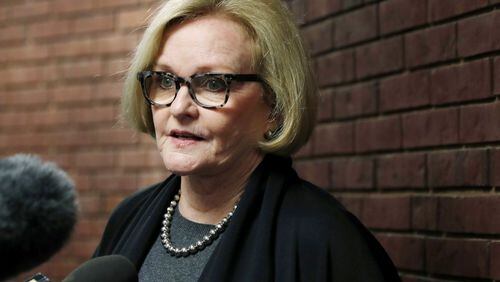PolitiFact last week looked at claims by two U.S. senators, on paid maternity leave and Obamacare insurance premium increases; and a foundation's allegation that Bryan County, Georgia, had "corrupt" voter rolls. Here are summaries of our findings. Full versions can be found at www.politifact.com.
“We’re the only developed nation in the world that doesn’t have paid maternity leave.”
— Sen. Claire McCaskill, D-Mo., on Tuesday, Aug. 22, 2017 in a town hall meeting in Monett, Mo.
The United States ranks dead last in a study conducted by the Organization for Economic Cooperation and Development on the national paid maternity-leave policies of its member countries. The OECD roster is the most frequently used measure of determining a developed country. On paid maternity leave, Mexico comes in second-to-last place. The average amount of paid leave time for mothers was a little over one year, as of 2016.
Though some U.S. companies provide paid maternity leave for employees, like Etsy, Ikea and Twitter, and some states require employers to offer some paid maternity leave, there is no national mandate.
Our ruling
Based on OECD and International Labour Organization data, the United States is the only industrialized nation without paid maternity leave. Yet some nations with paid maternity leave exclude certain groups of workers, meaning it isn’t quite universal. In the same sense, the United States has some states that do mandate paid maternity leave, and parents can take unpaid time off after a child is born or adopted, although there isn’t a national law.
We rate this statement Mostly True.
Bryan County, Ga., has “corrupted voter rolls.”
— Public Interest Legal Foundation on Monday, Sept. 25, 2017 in a press release
The situation in Bryan County is cleaner than the foundation would have us believe. Maintaining the voter rolls in Georgia is an ongoing process, and the foundation counted names on the Bryan County list that were flagged for possible removal.
In Georgia, the state, not the counties, maintains the voter rolls. Between 2014 and 2016, the state sent 4,323 letters asking people in Bryan County to confirm their voting status. In the same period the state removed 2,579 names.
In fact, Bryan County election supervisor Reynolds said the state cut 2,934 names from the rolls as of September 2017. The state was more aggressive than it had been over the past two years.
Our ruling
Based on all the data, there’s no evidence that the Bryan County rolls are corrupted. The foundation used data selectively and ignored ongoing efforts to clean up the voter rolls to reach an exaggerated conclusion.
We rate this claim False.
Under the Obamacare law, health insurance “premiums have increased by more than 105 percent since” 2013.
— Sen. John Cornyn, R-Texas, on Friday, Sept. 22, 2017 in a letter to a constituent
Experts we reached agreed premiums in 2017 were up quite a bit from 2013,while noting there are many factors to take into consideration.
Nationally, the U.S. Department of Health and Human Services reported average “monthly premiums increased from $232 in 2013 to $476 in 2017 and 62% of those states had 2017 exchange premiums at least double the 2013 average.” The change varied by state from a low of 12 percent (New Jersey) to a high of 222 percent (Alabama).
Experts conceded that under the Obamacare law, tax credits have eased what 80-plus percent of purchasers on the exchanges pay for coverage. That doesn’t make the premium increases less real. Taxpayers pick up the costs of tax credits.
Our ruling
Cornyn’s claim traces to an admittedly incomplete federal analysis of changes in 39 states that didn’t research premium changes in 11 states that run their own insurance exchanges. It’s also worth clarifying that Obamacare policies must cover pre-existing conditions without penalty and generally provide more benefits than were required in most states in 2013—surely factors figuring into increased premiums.
We rate this claim Mostly True.
About the Author






